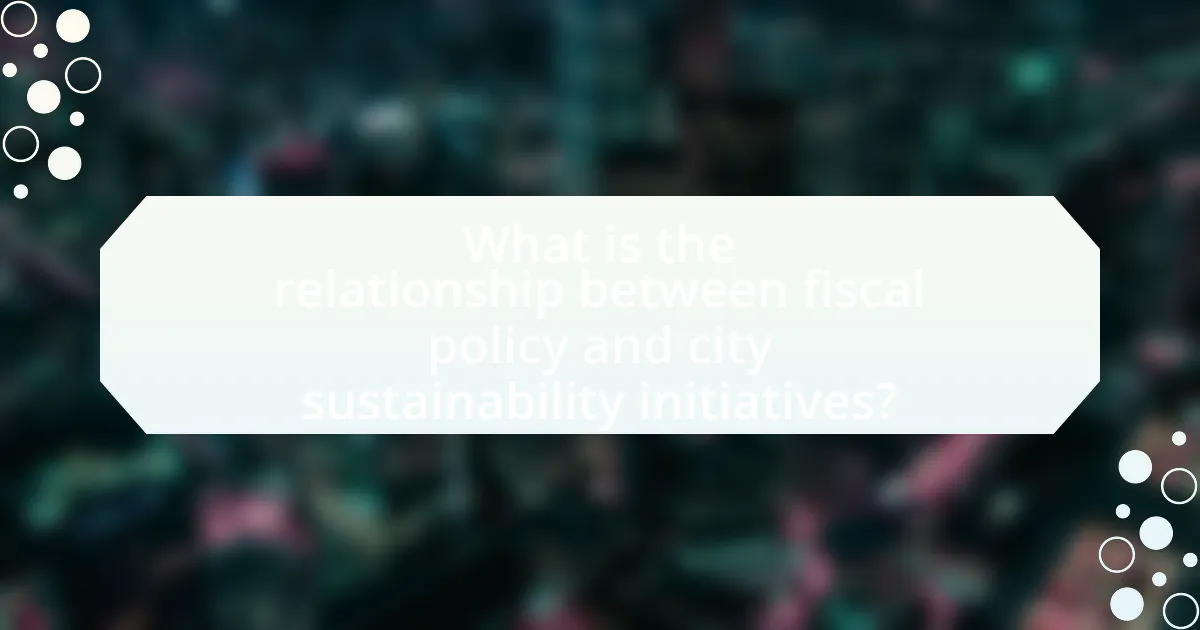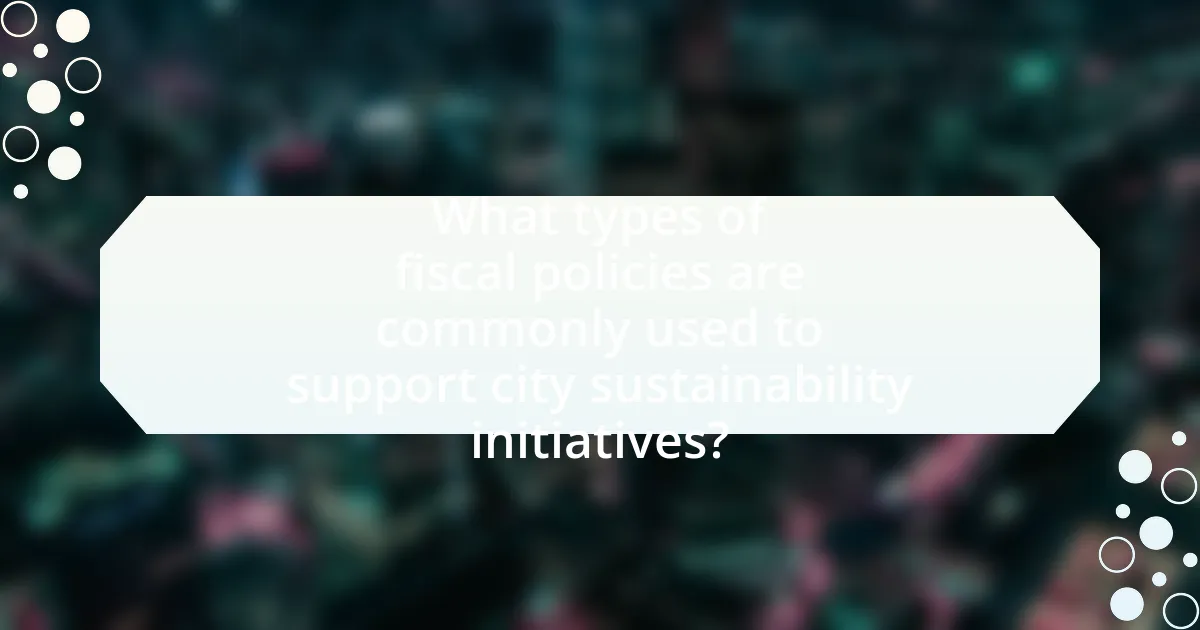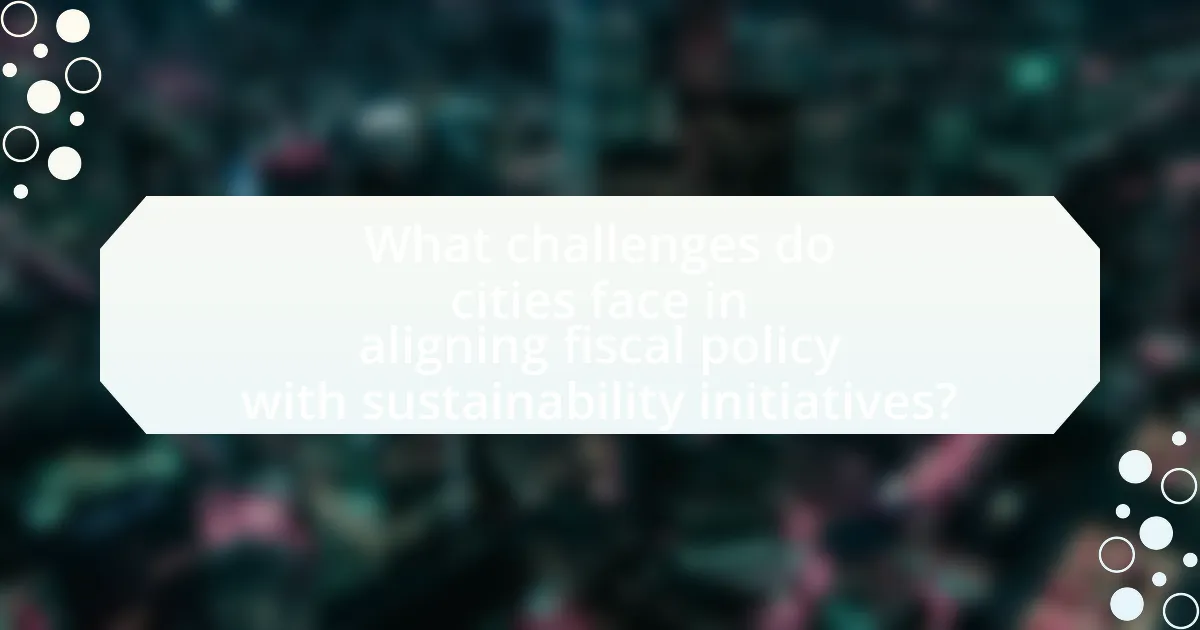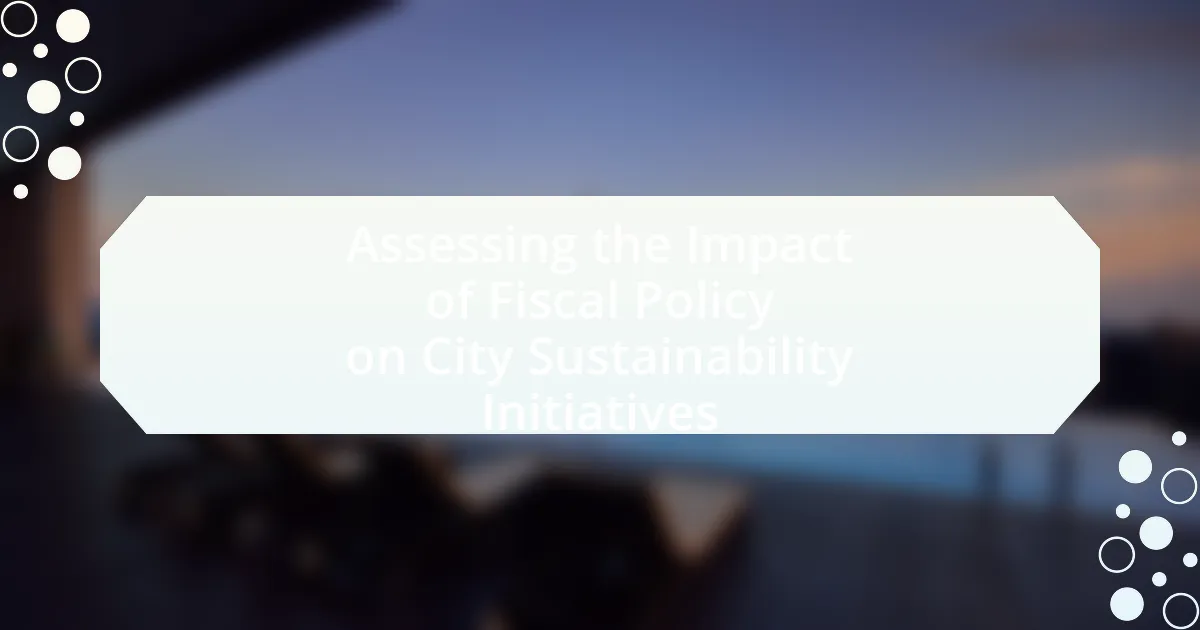The article examines the relationship between fiscal policy and city sustainability initiatives, highlighting how financial decisions impact urban environmental outcomes. It discusses the key components of fiscal policy, such as government spending, taxation, and subsidies, and their roles in promoting sustainable practices. The article also addresses the challenges cities face in aligning fiscal strategies with sustainability goals, the importance of assessing fiscal policies, and best practices for integrating community engagement into sustainability planning. Additionally, it outlines common fiscal policies used to support sustainability efforts and emphasizes the need for adaptive fiscal frameworks to meet evolving environmental challenges.

What is the relationship between fiscal policy and city sustainability initiatives?
Fiscal policy directly influences city sustainability initiatives by determining the allocation of public funds and resources towards sustainable development projects. For instance, cities that prioritize green infrastructure, renewable energy, and public transportation often do so through targeted fiscal policies that allocate budgetary resources to these areas. Research indicates that cities with robust fiscal policies that support sustainability can reduce greenhouse gas emissions by up to 30% over a decade, demonstrating a clear link between financial decisions and environmental outcomes.
How does fiscal policy influence urban sustainability efforts?
Fiscal policy significantly influences urban sustainability efforts by determining the allocation of public funds and investment priorities. Through mechanisms such as taxation, government spending, and subsidies, fiscal policy can incentivize sustainable practices, such as renewable energy projects and green infrastructure development. For instance, cities that implement tax credits for energy-efficient buildings or allocate budgetary resources for public transportation improvements can enhance their sustainability outcomes. Research indicates that cities with robust fiscal policies that prioritize sustainability see improved environmental quality and economic resilience, as evidenced by the 2019 report from the Urban Institute, which highlights the correlation between fiscal investments in sustainability and measurable reductions in carbon emissions.
What are the key components of fiscal policy that affect sustainability initiatives?
The key components of fiscal policy that affect sustainability initiatives include government spending, taxation, and subsidies. Government spending directed towards sustainable infrastructure, such as renewable energy projects and public transportation, directly influences the effectiveness of sustainability initiatives by providing necessary funding. Taxation policies, particularly those that impose higher taxes on carbon emissions or incentivize green technologies, can encourage businesses and individuals to adopt more sustainable practices. Additionally, subsidies for renewable energy sources and energy-efficient technologies can lower the financial barriers for adoption, thereby promoting sustainability. These components collectively shape the economic environment in which sustainability initiatives operate, impacting their feasibility and success.
How do different fiscal strategies impact city sustainability goals?
Different fiscal strategies significantly influence city sustainability goals by determining the allocation of resources towards sustainable initiatives. For instance, cities that implement green tax incentives can encourage investments in renewable energy and energy-efficient infrastructure, leading to reduced carbon emissions. A study by the Urban Institute found that cities utilizing performance-based budgeting can prioritize funding for sustainability projects, resulting in improved environmental outcomes. Conversely, cities that rely on traditional revenue sources, such as property taxes, may struggle to fund innovative sustainability programs, hindering progress towards their sustainability objectives. Thus, the choice of fiscal strategy directly affects a city’s ability to achieve its sustainability goals.
Why is assessing fiscal policy important for city sustainability?
Assessing fiscal policy is crucial for city sustainability because it directly influences resource allocation, economic stability, and long-term planning. Effective fiscal policies ensure that cities can fund essential services, infrastructure, and sustainability initiatives, which are vital for maintaining environmental health and social equity. For instance, cities that prioritize green investments through fiscal measures can reduce carbon emissions and enhance resilience against climate change. Research indicates that cities with robust fiscal frameworks are better positioned to implement sustainable practices, as they can attract investments and foster economic growth while addressing environmental challenges.
What are the potential consequences of neglecting fiscal assessments in sustainability planning?
Neglecting fiscal assessments in sustainability planning can lead to inadequate resource allocation, resulting in project failures and financial instability. Without proper fiscal evaluations, cities may invest in unsustainable initiatives that do not yield long-term benefits, leading to wasted funds and missed opportunities for economic growth. For instance, a study by the International Institute for Environment and Development highlights that cities lacking fiscal assessments often face budget overruns and project delays, undermining their sustainability goals. This misalignment can also erode public trust and hinder future investments in sustainable development.
How can fiscal assessments improve the effectiveness of sustainability initiatives?
Fiscal assessments can improve the effectiveness of sustainability initiatives by providing data-driven insights that guide resource allocation and policy decisions. These assessments evaluate the financial implications of sustainability projects, enabling cities to prioritize initiatives that yield the highest environmental and economic returns. For instance, a study by the International Council for Local Environmental Initiatives found that cities that conducted fiscal assessments were able to increase their investment in renewable energy projects by 30%, leading to significant reductions in carbon emissions. By identifying cost-effective strategies and potential funding sources, fiscal assessments ensure that sustainability initiatives are not only environmentally sound but also financially viable, ultimately enhancing their overall impact.

What types of fiscal policies are commonly used to support city sustainability initiatives?
Commonly used fiscal policies to support city sustainability initiatives include tax incentives, grants, and public-private partnerships. Tax incentives, such as property tax abatements or sales tax exemptions, encourage investment in sustainable infrastructure and renewable energy projects. Grants from federal or state governments provide funding for specific sustainability projects, such as energy efficiency upgrades or green transportation initiatives. Public-private partnerships leverage private sector investment to enhance public sustainability efforts, facilitating the development of eco-friendly projects while sharing financial risks. These policies have been shown to effectively mobilize resources and drive sustainable urban development.
What are the main categories of fiscal policies relevant to urban sustainability?
The main categories of fiscal policies relevant to urban sustainability include taxation, public expenditure, and financial incentives. Taxation policies can promote sustainable practices by imposing higher taxes on environmentally harmful activities and providing tax breaks for green initiatives. Public expenditure focuses on funding sustainable infrastructure projects, such as public transportation and renewable energy systems, which enhance urban sustainability. Financial incentives, such as grants and subsidies, encourage businesses and residents to adopt sustainable practices, thereby contributing to overall urban sustainability goals. These categories are essential for aligning fiscal strategies with sustainability objectives in urban settings.
How do tax incentives promote sustainable practices in cities?
Tax incentives promote sustainable practices in cities by reducing the financial burden on businesses and individuals who invest in eco-friendly technologies and initiatives. These incentives, such as tax credits or deductions for renewable energy installations, encourage the adoption of sustainable practices by making them more economically viable. For instance, a study by the National Renewable Energy Laboratory found that tax incentives significantly increased the installation of solar panels in urban areas, leading to a 20% rise in renewable energy capacity. This demonstrates that financial incentives directly correlate with increased investment in sustainability, thereby fostering a greener urban environment.
What role do public expenditures play in advancing sustainability initiatives?
Public expenditures play a crucial role in advancing sustainability initiatives by providing the necessary funding for projects that promote environmental protection, social equity, and economic viability. These expenditures enable governments to invest in renewable energy, public transportation, waste management, and green infrastructure, which are essential for reducing carbon emissions and enhancing urban resilience. For instance, a report by the International Monetary Fund in 2021 highlighted that targeted public spending on green projects can lead to a significant reduction in greenhouse gas emissions, demonstrating the effectiveness of fiscal policy in fostering sustainable development.
How do cities implement fiscal policies to enhance sustainability?
Cities implement fiscal policies to enhance sustainability by allocating financial resources towards green infrastructure, renewable energy projects, and sustainable public transportation systems. For instance, cities like San Francisco have adopted policies that provide tax incentives for businesses that invest in energy-efficient technologies, resulting in a significant reduction in greenhouse gas emissions. Additionally, municipalities often utilize grants and subsidies to support community-based sustainability initiatives, such as urban gardening and waste reduction programs, which have been shown to improve local environmental quality and promote community engagement. These fiscal strategies not only foster economic growth but also align with broader sustainability goals, as evidenced by the increasing number of cities committing to carbon neutrality by 2050.
What are the best practices for integrating fiscal policy into sustainability planning?
The best practices for integrating fiscal policy into sustainability planning include aligning budget allocations with sustainability goals, implementing tax incentives for green initiatives, and ensuring stakeholder engagement in the planning process. Aligning budget allocations ensures that financial resources are directed towards projects that promote environmental sustainability, such as renewable energy and waste reduction programs. Tax incentives encourage businesses and individuals to adopt sustainable practices, as evidenced by studies showing that tax credits for solar energy installations significantly increase adoption rates. Engaging stakeholders, including community members and local businesses, fosters collaboration and ensures that fiscal policies reflect the needs and priorities of the community, leading to more effective sustainability outcomes.
How can cities measure the effectiveness of their fiscal policies on sustainability outcomes?
Cities can measure the effectiveness of their fiscal policies on sustainability outcomes by utilizing key performance indicators (KPIs) that align with sustainability goals. These KPIs can include metrics such as reductions in greenhouse gas emissions, increases in renewable energy usage, and improvements in waste management efficiency. For instance, a city may track the percentage decrease in carbon emissions following the implementation of a green tax incentive, which can provide concrete evidence of fiscal policy impact. Additionally, cities can conduct cost-benefit analyses to evaluate the economic returns of sustainability investments, such as the financial savings from energy efficiency programs compared to their initial costs. This approach allows for a clear assessment of how fiscal policies contribute to achieving sustainability objectives, supported by data-driven evaluations.

What challenges do cities face in aligning fiscal policy with sustainability initiatives?
Cities face significant challenges in aligning fiscal policy with sustainability initiatives, primarily due to budget constraints and competing priorities. Limited financial resources often force city governments to prioritize immediate economic needs over long-term sustainability goals. For instance, a study by the Urban Institute highlights that many cities struggle to allocate funds for green infrastructure projects when faced with pressing demands for public services like education and public safety. Additionally, the complexity of integrating sustainability into existing fiscal frameworks can lead to inefficiencies and resistance from stakeholders who may not see the immediate benefits of such initiatives. This misalignment can hinder the effective implementation of policies aimed at reducing carbon emissions and promoting sustainable urban development.
What are the common barriers to effective fiscal policy implementation for sustainability?
Common barriers to effective fiscal policy implementation for sustainability include political resistance, lack of stakeholder engagement, insufficient data, and limited financial resources. Political resistance often arises from differing priorities among policymakers, which can hinder the adoption of sustainable fiscal measures. Lack of stakeholder engagement can lead to policies that do not reflect community needs or garner public support, reducing their effectiveness. Insufficient data impedes the ability to assess the impact of fiscal policies on sustainability, making it difficult to justify investments. Limited financial resources restrict the capacity of governments to implement and sustain long-term sustainability initiatives, as evidenced by studies showing that cities with constrained budgets struggle to prioritize environmental projects.
How do political and economic factors hinder fiscal policy alignment with sustainability goals?
Political and economic factors hinder fiscal policy alignment with sustainability goals by creating conflicting priorities and resource allocation challenges. Political factors, such as short election cycles and partisan divisions, often lead to a focus on immediate economic growth rather than long-term sustainability initiatives. For instance, policymakers may prioritize tax cuts or subsidies for fossil fuels to gain voter support, undermining investments in renewable energy. Economic factors, including budget constraints and market volatility, further complicate this alignment; cities may lack the financial resources to implement sustainable projects when faced with economic downturns. According to a report by the International Monetary Fund, countries that prioritize fiscal stability often neglect environmental investments, illustrating the tension between economic imperatives and sustainability objectives.
What strategies can cities adopt to overcome these challenges?
Cities can adopt strategies such as implementing green financing mechanisms, enhancing public-private partnerships, and promoting community engagement to overcome challenges related to sustainability initiatives. Green financing mechanisms, like green bonds, provide cities with the necessary capital to fund sustainable projects, evidenced by the $11 billion raised globally through green bonds in 2020 alone. Public-private partnerships can leverage private sector expertise and investment, as seen in successful collaborations for renewable energy projects. Additionally, promoting community engagement ensures that sustainability initiatives align with local needs, which has been shown to increase project success rates by up to 30% when residents are actively involved in planning and decision-making processes.
How can cities ensure long-term sustainability through fiscal policy?
Cities can ensure long-term sustainability through fiscal policy by implementing targeted tax incentives and funding mechanisms that promote environmentally friendly practices. For instance, cities can offer tax breaks for renewable energy projects, which encourages investment in sustainable infrastructure. According to a study by the International Council for Local Environmental Initiatives, cities that adopted green tax policies saw a 20% increase in renewable energy investments over five years. Additionally, cities can allocate budgetary resources to support public transportation and green spaces, which not only reduces carbon emissions but also enhances community well-being. Evidence from the Urban Sustainability Directors Network indicates that cities investing in sustainable public transit systems experience a significant reduction in traffic congestion and pollution levels, further validating the effectiveness of fiscal policies in promoting sustainability.
What role does community engagement play in shaping fiscal policies for sustainability?
Community engagement plays a crucial role in shaping fiscal policies for sustainability by ensuring that the voices and needs of local populations are integrated into decision-making processes. Engaged communities can provide valuable insights into local environmental challenges and priorities, which can inform the allocation of public funds and resources. For instance, studies have shown that cities with active community participation in budget planning tend to allocate more resources toward sustainable initiatives, such as green infrastructure and renewable energy projects. This participatory approach not only enhances transparency and accountability but also fosters a sense of ownership among residents, leading to more effective implementation of sustainability policies.
How can cities adapt their fiscal policies to changing sustainability needs over time?
Cities can adapt their fiscal policies to changing sustainability needs by implementing flexible budgeting processes that prioritize sustainable projects and initiatives. This adaptability can be achieved through regular assessments of sustainability goals, reallocating funds to emerging priorities, and integrating sustainability metrics into financial planning. For instance, cities like San Francisco have successfully redirected budget allocations towards renewable energy projects and green infrastructure, demonstrating a commitment to evolving sustainability objectives. Additionally, cities can leverage public-private partnerships to enhance funding for sustainability initiatives, ensuring that fiscal policies remain responsive to community needs and environmental challenges.
What are the best practices for assessing the impact of fiscal policy on city sustainability initiatives?
The best practices for assessing the impact of fiscal policy on city sustainability initiatives include establishing clear metrics for evaluation, conducting comprehensive data analysis, and engaging stakeholders throughout the process. Clear metrics, such as greenhouse gas emissions reductions and economic growth indicators, provide a framework for measuring success. Comprehensive data analysis, including both quantitative and qualitative methods, allows for a thorough understanding of the fiscal policy’s effects. Engaging stakeholders, including community members and local businesses, ensures that diverse perspectives are considered, enhancing the relevance and effectiveness of the assessment. These practices are supported by studies indicating that cities employing structured evaluation frameworks achieve better sustainability outcomes.

Leave a Reply